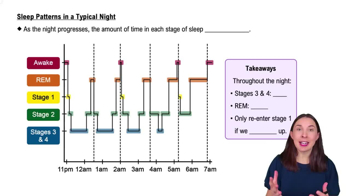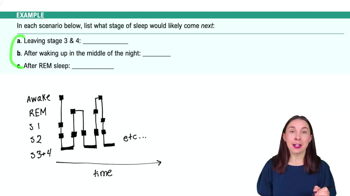Table of contents
- 1. Introduction to Psychology1h 43m
- 2. Psychology Research2h 20m
- 3. Biological Psychology2h 41m
- 4. Sensation and Perception28m
- 5. Consciousness and Sleep32m
- 6. Learning41m
- 7. Memory34m
- 8. Cognition37m
- 9. Emotion and Motivation35m
- 10. Developmental Psychology33m
- 11. Personality48m
- 12. Social Psychology41m
- 13. Stress and Health41m
- 14. Psychological Disorders44m
- 15. Treatment47m
5. Consciousness and Sleep
Sleep
Struggling with Psychology?
Join thousands of students who trust us to help them ace their exams!Watch the first videoMultiple Choice
The _____ theory of sleep says that sleep is a product of evolution.
A
restorative
B
activation-synthesis
C
activation-information-mode
D
adaptive
 Verified step by step guidance
Verified step by step guidance1
Identify the key concept in the question, which is the 'theory of sleep' that relates to evolution.
Review the list of theories provided: restorative, activation-synthesis, activation-information-mode, and adaptive.
Understand the basic premise of each theory: Restorative theory suggests sleep is for physical recovery, Activation-synthesis theory relates to dream formation, Activation-information-mode theory is about dream content processing, and Adaptive theory suggests sleep evolved as a survival mechanism.
Focus on the Adaptive theory, which posits that sleep patterns evolved to enhance survival by conserving energy and protecting organisms during periods of vulnerability.
Conclude that the Adaptive theory is the one that aligns with the evolutionary perspective of sleep, as it emphasizes the role of sleep in adaptation and survival.

 3:25m
3:25mWatch next
Master Circadian Rhythms with a bite sized video explanation from Hannah Gordils
Start learningRelated Videos
Related Practice


































































































![Race, Genes and IQ Differences | Bret Weinstein [Mini Clip]](https://img.youtube.com/vi/IztL_m3pd70/mqdefault.jpg)



































































































